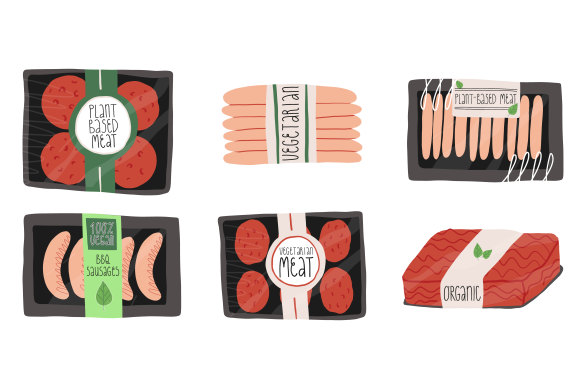Plenty of us could do with less meat in our diets, but should we really be swapping it for plant-based products?

With more than 300 different plant-based proteins now available in supermarkets, there is certainly a demand for alternatives to cook for dinner that are not from animal sources.
From a health perspective, there is evidence to show that plant-based diets are associated with a longer lifespan, a lower risk of developing lifestyle diseases such as type 2 diabetes, and a lower body weight.
With current recommendations suggesting that no more than 455g of cooked, lean red meat be consumed each week (and many a single steak weighs more than this), it suggests plenty of us could do with less meat in our diet. The question is, are meat alternatives actually healthier?

What is plant-based meat?
You can now find a large and growing range of plant-based alternatives to most types and cuts of meat, poultry and even seafood. Plant-based burgers, sausages, mince, prawns, deli meats and chicken are available in fresh and frozen varieties in supermarkets.
Protein alternatives are typically made using a wide range of different ingredient bases, including soy and vegetable proteins, oil, starches, thickeners and plenty of flavours and often colours to create a product that mimics the look and taste of animal protein.
Are plant-based meats healthier?
Plant-based meat alternatives are often lower in saturated fat than meat, but not always, and a closer look at the ingredient lists of plant-based protein alternatives will often reveal a long list of additives, flavours, oils and fillers, which also means that many plant-based types of meat fall into an “ultra-processed” food category.
There are a handful of options that do have relatively high protein percentages, thanks to a soy or textured vegetable protein base, but again, in many cases, even these varieties are full of refined carbohydrates and vegetable oil to create a meat-like consistency.

Plant-based ‘meat’ is not meat
One of the most important things to remember when considering adding plant-based meat alternatives into your diet, is that nutritionally these options are very different to lean meat, chicken or seafood.
A serving of animal protein naturally contains 20-30g of well-absorbed dietary protein, a range of essential nutrients, including vitamin B12, iron and zinc, and little to no salt or carbohydrates. However, even the protein-rich plant-protein meat options struggle to reach 10-15g of protein per serve, and generally have a serve or two of carbohydrate and plenty of added salt.
Nutritionally, this means that plant-based meat alternatives are fundamentally different nutritionally to animal-based proteins and, as such, should not be considered interchangeable in the diet.
Is meat healthier?
Ultimately, the decision of whether to include animal-based foods in your diet is a personal one. From a health perspective, consuming excessive amounts of red meat, high-fat cuts in particular, is associated with a higher risk of developing a number of lifestyle diseases, including some types of cancer.
On the other hand, when consumed in moderation, lean red meat, fish, and chicken are nutrient-dense foods that are minimally processed. As such, they can be consumed as part of a healthy balanced diet, and in many cases, you are not better off nutritionally to opt for an ultra-processed form of plant-based protein.
How to make the best ‘plant-based’ choice
If you are actively trying to reduce your red meat intake or are a vegetarian or vegan and looking to make the healthiest plant-based choices, start by seeking out options that have a base of either soy or vegetable protein, which can be determined if they are one of the first ingredients listed.
Ideally, a plant-based meat alternative will offer at least 10-15g of protein per serving, less than 10 per cent fat, and less than 3 per cent saturated fat overall. Options that contain no added sugars, and less than 300mg of sodium per serve are also ideal. Where you can, find options that have added iron, zinc and vitamin B12 to help ensure you are getting adequate amounts of these essential nutrients.
The take-home message
The relative health benefits of a plant-based diet come from eating more plants. This means that when it comes to plant-based meals, you are much better off focusing your diet on whole, natural, plant-based foods such as vegetables and legumes than seeking out ultra-processed meat alternatives.
There are a handful of meat alternatives that fare relatively well nutritionally in supermarkets and contain protein and key micronutrients, which can help to expand the range of meal options for those eating plant-based diets. But check ingredient lists and nutritional labels to ensure you are actually getting a decent serve of protein and not just a whole lot of extra fat and carbohydrate disguised as meat.
The best recipes from Australia’s leading chefs straight to your inbox.
Sign up
